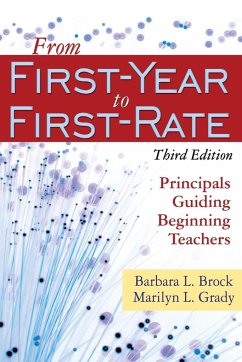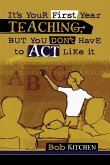Barbara L. Brock, Marilyn L. Grady
From First-Year to First-Rate
Principals Guiding Beginning Teachers
Barbara L. Brock, Marilyn L. Grady
From First-Year to First-Rate
Principals Guiding Beginning Teachers
- Broschiertes Buch
- Merkliste
- Auf die Merkliste
- Bewerten Bewerten
- Teilen
- Produkt teilen
- Produkterinnerung
- Produkterinnerung
This new edition of the bestseller features more voices from first-year teachers and provides strategies for developing a first-year induction plan to help teachers become first-rate educators.
Andere Kunden interessierten sich auch für
![It's Your First Year Teaching, But You Don't Have to Act Like It It's Your First Year Teaching, But You Don't Have to Act Like It]() Bob KitchenIt's Your First Year Teaching, But You Don't Have to Act Like It55,99 €
Bob KitchenIt's Your First Year Teaching, But You Don't Have to Act Like It55,99 €![How to succeed in your first year of university studies? How to succeed in your first year of university studies?]() Innocent Kazadi NkashamaHow to succeed in your first year of university studies?26,99 €
Innocent Kazadi NkashamaHow to succeed in your first year of university studies?26,99 €![Effects of Oral Reading Rate and Inflection on Comprehension and Its Maintenance Effects of Oral Reading Rate and Inflection on Comprehension and Its Maintenance]() Henry TenenbaumEffects of Oral Reading Rate and Inflection on Comprehension and Its Maintenance101,99 €
Henry TenenbaumEffects of Oral Reading Rate and Inflection on Comprehension and Its Maintenance101,99 €![Getting to Grips with English Grammar, Year 5 Getting to Grips with English Grammar, Year 5]() Charlotte MakhloufGetting to Grips with English Grammar, Year 527,99 €
Charlotte MakhloufGetting to Grips with English Grammar, Year 527,99 €![Stepping up to the Second Year at University Stepping up to the Second Year at University]() Stepping up to the Second Year at University196,99 €
Stepping up to the Second Year at University196,99 €![A Year in His Presence A Year in His Presence]() Audrey D. McCoyA Year in His Presence13,99 €
Audrey D. McCoyA Year in His Presence13,99 €![The Louisa Alcott Reader: A Supplementary Reader for the Fourth Year of School The Louisa Alcott Reader: A Supplementary Reader for the Fourth Year of School]() Louisa May AlcottThe Louisa Alcott Reader: A Supplementary Reader for the Fourth Year of School36,99 €
Louisa May AlcottThe Louisa Alcott Reader: A Supplementary Reader for the Fourth Year of School36,99 €-
-
-
This new edition of the bestseller features more voices from first-year teachers and provides strategies for developing a first-year induction plan to help teachers become first-rate educators.
Hinweis: Dieser Artikel kann nur an eine deutsche Lieferadresse ausgeliefert werden.
Hinweis: Dieser Artikel kann nur an eine deutsche Lieferadresse ausgeliefert werden.
Produktdetails
- Produktdetails
- Verlag: Corwin
- 3. Auflage
- Seitenzahl: 162
- Erscheinungstermin: 5. Januar 2007
- Englisch
- Abmessung: 229mm x 152mm x 9mm
- Gewicht: 245g
- ISBN-13: 9781412916035
- ISBN-10: 1412916038
- Artikelnr.: 21958407
- Herstellerkennzeichnung
- Libri GmbH
- Europaallee 1
- 36244 Bad Hersfeld
- gpsr@libri.de
- Verlag: Corwin
- 3. Auflage
- Seitenzahl: 162
- Erscheinungstermin: 5. Januar 2007
- Englisch
- Abmessung: 229mm x 152mm x 9mm
- Gewicht: 245g
- ISBN-13: 9781412916035
- ISBN-10: 1412916038
- Artikelnr.: 21958407
- Herstellerkennzeichnung
- Libri GmbH
- Europaallee 1
- 36244 Bad Hersfeld
- gpsr@libri.de
Barbara L. Brock is a professor of education at Creighton University in Omaha, Nebraska. She has held a variety of positions in education, including education department chair, director of school administration, elementary principal, and K-12 teacher. She presents nationally and internationally on topics of beginning teacher induction, leadership succession, teacher and principal burnout, and educators with disabilities. She is coauthor with Marilyn Grady of Principals in Transition: Tips for Surviving Succession, From First-Year to First-Rate: Principals Guiding New Teachers, Rekindling the Flame: Principals Combating Teacher Burnout, Avoiding Burnout: A Principal's Guide to Keeping the Fire Alive, and Launching Your First Principalship. She has published in a number of journals, including The Journal of the Mid-Western Research Association, Educational Considerations, Connections, Clearinghouse, and Catholic Education: A Journal of Inquiry and Practice. She received her bachelor of arts degree in art education from Briar Cliff University, a master of arts with a specialty in school administration from Creighton University, and a doctorate in administration, curriculum, and instruction from the University of Nebraska-Lincoln.
Acknowledgments About the Authors Introduction 1. Understanding the Beginning Teacher The Mature Beginner Alternative Certification Beginning Teachers From Minority Groups Reentry to Teaching Experienced Teachers in a New School Summary 2. Helping Beginning Teachers Face Problems and Barriers Reality Shock Theoretical Knowledge Base Administrators and Expectations Isolation New Kid on the Block Classroom Dilemmas Addressing Differing Student Needs Assessment Setup for Failure Inferior Working Conditions Are You Old Enough to Be a Teacher? Nonpublic Schools Rural Schools Overwhelmed Summary 3. Acclimating the Beginning Teacher The Strength of School Cultures Socializing the Beginning Teacher Summary 4. Working With Beginning Teachers: The Role of the Principal The Power of the Principal The Leadership of the Principal Why Should Principals Work With Beginning Teachers? What Expectations Do Principals Have? What Is the Principal
s Role With Beginning Teachers? What Problems Are Within the Control of the Principal? Formative and Summative Evaluation Support for the Principal How Do Principals Find the Time to Help? Assessing Time Spent Taking Charge of Your Time Summary 5. Starting Orientation Before the School Year Begins The Orientation Phase Orientation Meetings: Setting the Stage The Role of the Principal in Orientation Summary 6. Developing a Good Induction Program What Is Developmental Induction? Organizational Structure Program Delivery Summary 7. Building a Teacher-Mentor Support Team Where Did the Idea of Mentors Originate? How Do We Know That Mentoring Works? What Are the Benefits of Mentorships? Beginning a Teacher-Mentor Program The Needs of New Teachers The Framework of a Mentor Program What Are the Requirements for a Mentor? Matching Mentors With Entry-Year Teachers The Process of Mentoring How Should Mentors Be Oriented? Training of Mentors Diagnosing Problems Conferencing With Beginners The Role of Other Faculty Administrative Support University Consultants Program Evaluation Summary 8. Helping Beginning Teachers With Common Problems Helping With Specific Problems The Principal
s Role The Teacher
s Role--And Ways the Principal Can Help Summary 9. Measuring Induction Program Success Needs Assessment Goals Year-End Evaluation Principals
Self Assessments Summary 10. Integrating Induction and Career-Long Development Development That Spans a Teaching Career Strategies for Adult Learners Meeting the Needs of the Developing Adult When Reflection and Renewal Diminish Fostering a Culture for Growth A Model for Continuous Development A Model for Continuous Learning Summary References
s Role With Beginning Teachers? What Problems Are Within the Control of the Principal? Formative and Summative Evaluation Support for the Principal How Do Principals Find the Time to Help? Assessing Time Spent Taking Charge of Your Time Summary 5. Starting Orientation Before the School Year Begins The Orientation Phase Orientation Meetings: Setting the Stage The Role of the Principal in Orientation Summary 6. Developing a Good Induction Program What Is Developmental Induction? Organizational Structure Program Delivery Summary 7. Building a Teacher-Mentor Support Team Where Did the Idea of Mentors Originate? How Do We Know That Mentoring Works? What Are the Benefits of Mentorships? Beginning a Teacher-Mentor Program The Needs of New Teachers The Framework of a Mentor Program What Are the Requirements for a Mentor? Matching Mentors With Entry-Year Teachers The Process of Mentoring How Should Mentors Be Oriented? Training of Mentors Diagnosing Problems Conferencing With Beginners The Role of Other Faculty Administrative Support University Consultants Program Evaluation Summary 8. Helping Beginning Teachers With Common Problems Helping With Specific Problems The Principal
s Role The Teacher
s Role--And Ways the Principal Can Help Summary 9. Measuring Induction Program Success Needs Assessment Goals Year-End Evaluation Principals
Self Assessments Summary 10. Integrating Induction and Career-Long Development Development That Spans a Teaching Career Strategies for Adult Learners Meeting the Needs of the Developing Adult When Reflection and Renewal Diminish Fostering a Culture for Growth A Model for Continuous Development A Model for Continuous Learning Summary References
Acknowledgments About the Authors Introduction 1. Understanding the Beginning Teacher The Mature Beginner Alternative Certification Beginning Teachers From Minority Groups Reentry to Teaching Experienced Teachers in a New School Summary 2. Helping Beginning Teachers Face Problems and Barriers Reality Shock Theoretical Knowledge Base Administrators and Expectations Isolation New Kid on the Block Classroom Dilemmas Addressing Differing Student Needs Assessment Setup for Failure Inferior Working Conditions Are You Old Enough to Be a Teacher? Nonpublic Schools Rural Schools Overwhelmed Summary 3. Acclimating the Beginning Teacher The Strength of School Cultures Socializing the Beginning Teacher Summary 4. Working With Beginning Teachers: The Role of the Principal The Power of the Principal The Leadership of the Principal Why Should Principals Work With Beginning Teachers? What Expectations Do Principals Have? What Is the Principal
s Role With Beginning Teachers? What Problems Are Within the Control of the Principal? Formative and Summative Evaluation Support for the Principal How Do Principals Find the Time to Help? Assessing Time Spent Taking Charge of Your Time Summary 5. Starting Orientation Before the School Year Begins The Orientation Phase Orientation Meetings: Setting the Stage The Role of the Principal in Orientation Summary 6. Developing a Good Induction Program What Is Developmental Induction? Organizational Structure Program Delivery Summary 7. Building a Teacher-Mentor Support Team Where Did the Idea of Mentors Originate? How Do We Know That Mentoring Works? What Are the Benefits of Mentorships? Beginning a Teacher-Mentor Program The Needs of New Teachers The Framework of a Mentor Program What Are the Requirements for a Mentor? Matching Mentors With Entry-Year Teachers The Process of Mentoring How Should Mentors Be Oriented? Training of Mentors Diagnosing Problems Conferencing With Beginners The Role of Other Faculty Administrative Support University Consultants Program Evaluation Summary 8. Helping Beginning Teachers With Common Problems Helping With Specific Problems The Principal
s Role The Teacher
s Role--And Ways the Principal Can Help Summary 9. Measuring Induction Program Success Needs Assessment Goals Year-End Evaluation Principals
Self Assessments Summary 10. Integrating Induction and Career-Long Development Development That Spans a Teaching Career Strategies for Adult Learners Meeting the Needs of the Developing Adult When Reflection and Renewal Diminish Fostering a Culture for Growth A Model for Continuous Development A Model for Continuous Learning Summary References
s Role With Beginning Teachers? What Problems Are Within the Control of the Principal? Formative and Summative Evaluation Support for the Principal How Do Principals Find the Time to Help? Assessing Time Spent Taking Charge of Your Time Summary 5. Starting Orientation Before the School Year Begins The Orientation Phase Orientation Meetings: Setting the Stage The Role of the Principal in Orientation Summary 6. Developing a Good Induction Program What Is Developmental Induction? Organizational Structure Program Delivery Summary 7. Building a Teacher-Mentor Support Team Where Did the Idea of Mentors Originate? How Do We Know That Mentoring Works? What Are the Benefits of Mentorships? Beginning a Teacher-Mentor Program The Needs of New Teachers The Framework of a Mentor Program What Are the Requirements for a Mentor? Matching Mentors With Entry-Year Teachers The Process of Mentoring How Should Mentors Be Oriented? Training of Mentors Diagnosing Problems Conferencing With Beginners The Role of Other Faculty Administrative Support University Consultants Program Evaluation Summary 8. Helping Beginning Teachers With Common Problems Helping With Specific Problems The Principal
s Role The Teacher
s Role--And Ways the Principal Can Help Summary 9. Measuring Induction Program Success Needs Assessment Goals Year-End Evaluation Principals
Self Assessments Summary 10. Integrating Induction and Career-Long Development Development That Spans a Teaching Career Strategies for Adult Learners Meeting the Needs of the Developing Adult When Reflection and Renewal Diminish Fostering a Culture for Growth A Model for Continuous Development A Model for Continuous Learning Summary References








